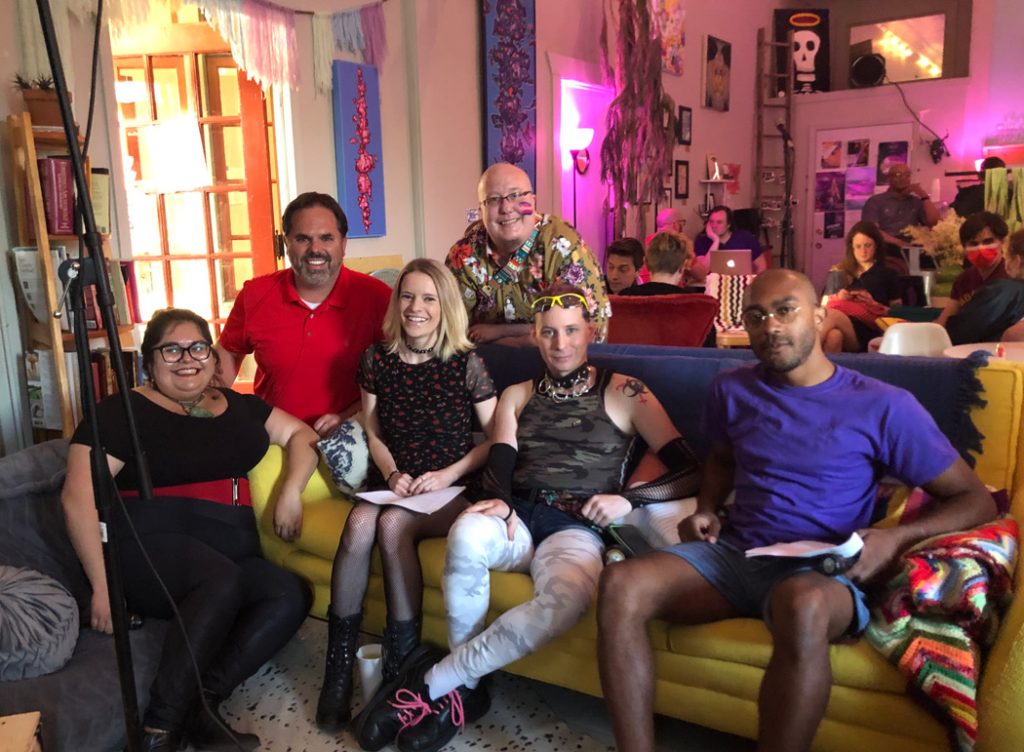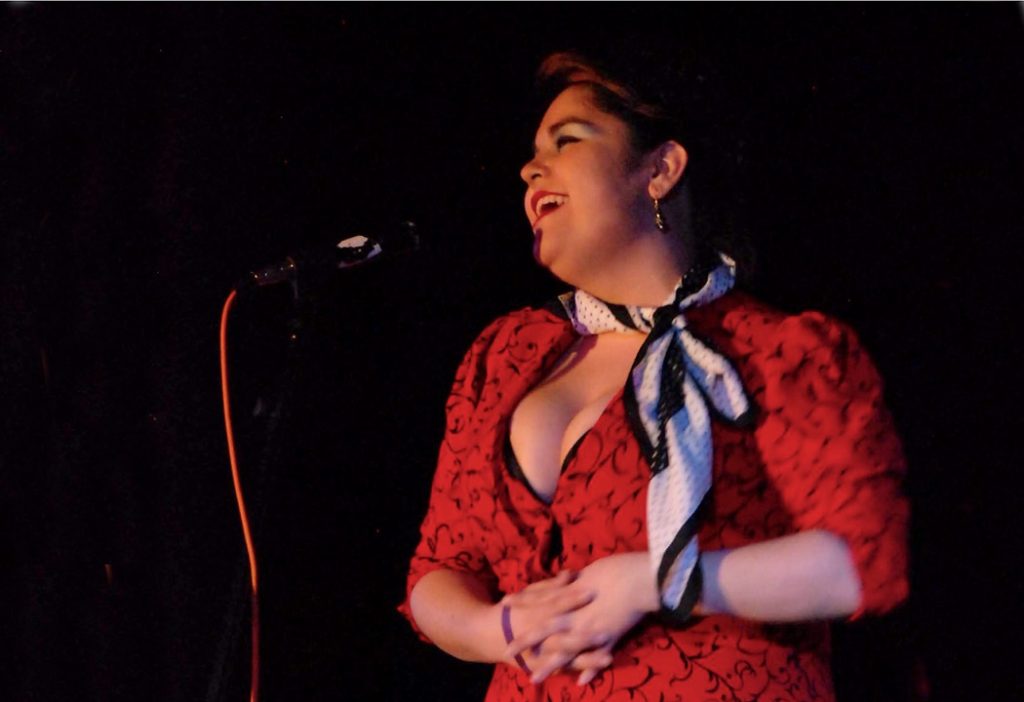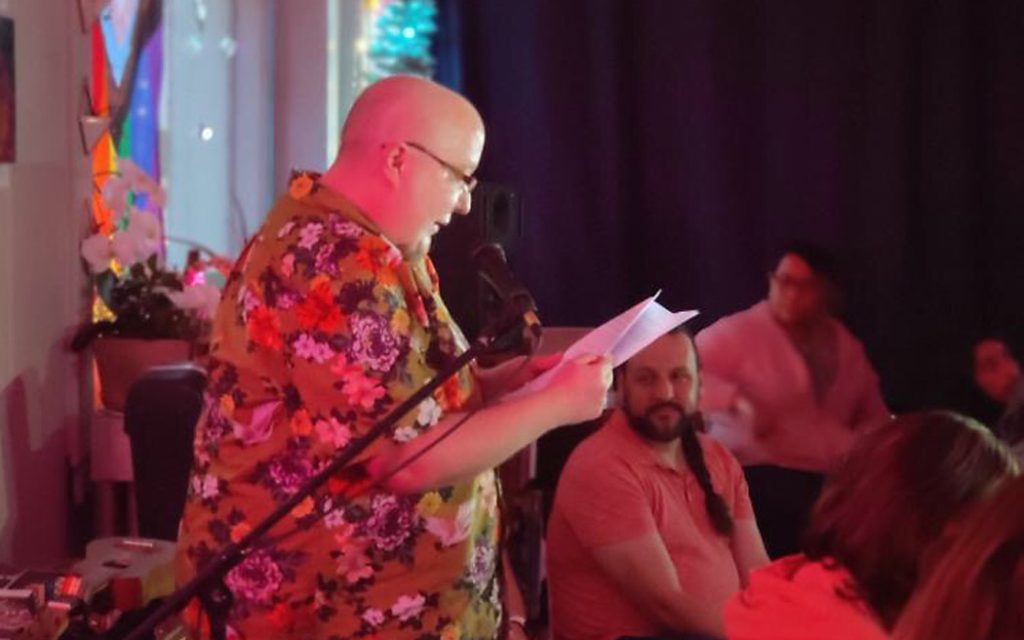
Soapbox Speakeasy, the language arts performance forum whose packed shows coincided with Fairfield First Fridays from 2013 to 2015, has returned. Soapbox uses language to facilitate community connection, address social issues, and give everyone a voice. “Speak for yourself. That’s the soapbox motto,” says founder Monserrat Iñiguez. “Speak for yourself. Find your voice.”
Not just a platform for spoken word, Soapbox celebrates all language arts, including body language. Past shows have involved rap, dance, and different styles of poetry. “Words are so fun,” says Iñiguez. “I think about them all the time, imagining words together, creating vivid images and feelings.”

Iñiguez explains that Soapbox celebrates “whatever form of expression comes through that includes words,” and it was created to remind people that poetry and other language arts are meant to be performed with energy and audacity. “I love poetry,” Iñiguez says. “I love how alive it is. And I hate how dully it’s presented.” Iñiguez revolts against the idea that poetry readings are supposed to be somber. “I’m just too colorful for that,” she says. “Let’s just spice this up and really read the words that are on the page.”
Iñiguez founded Soapbox in November of 2013 as a venue to attract all the “awesome poets and writers” around town to do a show “that would inspire me to step my game up.” It went on hiatus in 2015, but has returned with more socially relevant, powerful performances.

Taboo II, held on June 11 during Pride Month, featured Tamlin Orion Day and other LGBTQIA+ performers exploring the intersectional identities in the LGBTQIA+ community. Next up is The Chimera (scheduled for August 12, 9 p.m., at Noble House), featuring David Richardson, who described the performance as “a dip in the collective unconscious.”
The Soapbox Speakeasy Experience
A Soapbox performance is carefully crafted to create an immersive audio experience. Participants have ranged from ages 14 to 60, from first-time writers to published poets and recording artists. “No one will be turned away for lack of writing skills,” Iñiguez says. “I think we do a great job of having a broad spectrum of ability.”
Performers stand on soapboxes—-built by artist Nick Ulin—positioned at different points around the room. The sound system was contributed by Tim Britton. Performers rotate among the soapboxes and the audience moves with the performance, keeping everyone engaged. “It’s a whole sensory experience,” Iñiguez enthuses, “because that is how poetry moves people.” She loves how Soapbox performances help people realize “you are hungry. You are hungry for poetry.”
In the past, Soapbox performances were held about every four weeks, centered around a theme chosen by that month’s main performer, called the headliner. Then Iñiguez extended it to a six-week format, allowing for three weeks dedicated to writing and creating, and three weeks dedicated to honing the performance. “It’s the exploration into the theatrics of your own words that will really help you understand how they’re supposed to be expressed,” Iñiguez says.
Headliners are “carefully selected based on their body of work and the skills that they show in the workshop process. It’s also important that they have contributed to the development of other people’s shows—Soapbox is a collaborative process.” Iñiguez says headliners “have exhibited strong leadership skills and abilities,” adding that she mentors and coaches people through the process.
Headliners run the workshops and get 20 minutes of solo performance time. They also work with graphic designer Colin Faulkner El to develop posters that are sold at the show for a donation.
Support from ArtForce Iowa
Iñiguez has long been involved in community activism, social justice, and poetry as performance art. The daughter of Mexican immigrants, and born and raised in Los Angeles, she worked at the Labor Community Strategy Center, a think/act tank, learning grassroots organizing in support of low-income, working-class communities of color.
After moving to Iowa, Iñiguez worked for the Civil Rights Commission for the city of Des Moines, where she was involved in the Emmy Award-winning documentary Breaking Bread, Building Bridges. Currently, she is based in Fairfield, working for ArtForce Iowa, a 501(c)(3) nonprofit with a mission to create opportunities for youth to transform through art. Iñiguez says Soapbox is under its fiscal sponsorship. “When I got hired to ArtForce,” she explains, “they knew how important Soapbox was to me and wanted to support my vision and goals by sponsoring Soapbox, . . . a space where folks can really come together and just slow down and think together.”
The Constitutional Convention
Inspired by her experience working on Breaking Bread, Building Bridges, which brought together “folks from different backgrounds and different lenses to come together to see if they could make a connection,” Iñiguez formulated a special intensive 10-week Soapbox workshop called the Constitution Convention, currently in process. Over the course of the workshop, participants will consider what the Constitutional Convention would look like today if they were the founders of America.
“I do not want people to come in with an agenda or platform,” Iñiguez says. “I really am formulating those workshops to get to the core of a person’s belief, so that they can speak for themselves. It is about the people, not the party. The people, not the platform.”
Iñiguez wants the workshop space to feel safe for everyone involved to authentically explore and express their thoughts and opinions. “The goal is to see if we can get folks with differing opinions to come to some common ground, and exemplify and model that through our performance. To show what those conversations can look like, without becoming hostile. I think communities really need to see that they are capable of that right now. Especially now.”
Participation in the Soapbox Speakeasy is free. If you’d like to get involved in a future Soapbox Speakeasy, visit Instagram.com/soapboxspeakeasy, where workshop information and meetings are posted.
